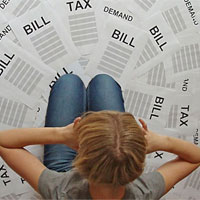It’s a tough decision to make, but filing for bankruptcy can be a helpful way of getting rid of debt that is simply too much to bear. If you’re considering filing for bankruptcy or have already filed, there are a few things to consider when it comes time to file your taxes. There are different types of bankruptcy and each comes with provisions and rules that are different from the others. Here are a few things to consider when/if you file for bankruptcy and how they will affect your taxes.
1) Are you filing under Chapter 7 or 13? There is a very real difference between Chapter 7 and 13 bankruptcy. First off, Chapter 7 is basically a judge saying you are “wiped-out” as far as paying your debts off. You are (for the most part) not required to pay off much of your debt but are more severely influenced by the decision. Filing Chapter 13 bankruptcy is in essence, a debt repayment plan. The main reason you would file for Chapter 13 bankruptcy would be in an effort to pay off debts on a sliding scale (and at a reduced amount) and not be affected by the bankruptcy as long as you would if you filed for Chapter 7 bankruptcy.
2) Rules of Chapter 7 and Taxes: If you file for Chapter 7 bankruptcy, there are a few things to keep in mind. First, income taxes are eligible for full forgiveness, but if and only if all of these rules are met:
- The due date for the tax return you owe must be at least 3 years old and extensions are a part of this timeline
- The tax return for the income taxes must be 2 years before filing for bankruptcy
- The taxes were assessed by the IRS at least 240 days before filing
- Your tax return was not fraudulent
- You were not found guilty of tax evasion.
If you meet all of the above criteria, you should be in the clear when it comes to owed income tax. Just be aware that you may still be required to pay for any liens that the government has placed on things like equity from property and IRA accounts.
3) Rules of Chapter 13 and Taxes: Chapter 13 bankruptcy as stated before, is not as severe as Chapter 7, but still requires that some of your debt be paid off at the discretion of a bankruptcy judge. Often, the judge will look at what you have (in regards to income, equity, etc.) and create a payment plan to a trustee afterward. It’s almost certain that your payments will be lowered and you won’t have to pay your income tax debts in full.
However, there are stipulations, for example, it must be in regards to income taxes, have been due for 3 years and have been assessed by the IRS at least 240 days before. Also, being convicted of fraudulent tax returns (which would mean you don’t qualify for Chapter 7) is not a disqualification when applying for Chapter 13 bankruptcy. Also, in order to qualify for Chapter 13 bankruptcy, you must have a steady income (a job, disability, social security), not have unsecured debt (student loans, credit cards, insurance bills, etc.) over $250,000 or secured debt (mortgage, car loan) over $750,000.
Bankruptcy should be a last ditch effort to control the amount of debt you’re dealing with. It will stay with you for years and severely affect your credit score and even job prospects. However, if it’s the right decision for you, be sure to educate yourself on the different types of bankruptcy and how they will affect you when it comes time to file your taxes.
Guest author: Malia Anderson is a Southern writer who specializes in money and DIY projects. In her free time, she fixes ukeleles and makes pottery.
